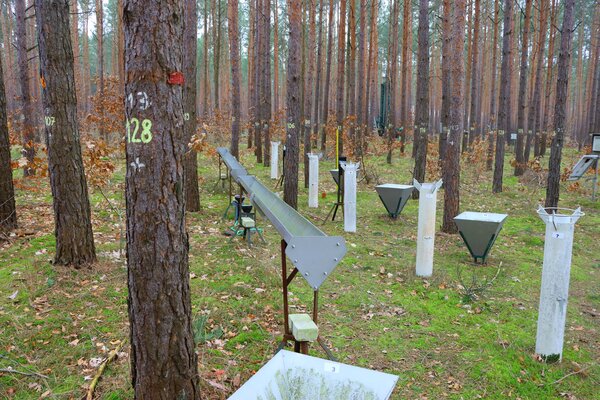Research sites

Ongoing climate change makes it necessary for forests to adapt to the climate of tomorrow. We are testing the adaptability of young forest trees in our open-air dry laboratory and in greenhouse experiments. We observe the growth and vitality of older trees and stands on experimental plots in the forest. By analyzing the relationships between the effects of weather and tree reactions to it, we gain insights into the stress tolerance of forests. We use the results to derive recommendations for future forest management.
Changing environmental conditions and different management systems influence biodiversity in forests and landscapes. With our own investigations and evaluations of data from intensive forest environmental monitoring, we provide new insights into the effects of environmental characteristics and management change on aspects of biodiversity and the consequences for forest nature conservation.
The Britz intensive monitoring area with its nine large lysimeters and several climate stations, planted with different tree species and mixtures, provides insights into the production of groundwater. This is an important service provided by the forest. Tree species, age and management are of decisive importance for the amount of groundwater recharge. These findings are the result of many years of research.
Installations of sap flow measurements show in high temporal resolution how trees use water. Visit one of our trees under Treewatch.net and follow shrinkage and swelling movements caused by water transport. Here we collect important information on the reaction of trees to climatic changes.
Unmanned aerial vehicles, which we use to assess changes in the canopy, provide a view from above. This perspective is rare in the forest and provides new insights into the very individual phases of leaf development and discoloration of trees in an otherwise homogeneous stand. This information helps us to better explain the reaction possibilities of tree individuals and to further develop growth models.
Researcc facilities
Contact

- Phone
- +49 3334 3820 339
- tanja.sanders@thuenen.de
Head of Ecology and Forest Dynamics, Contact person Intensive Forest Monitoring

![[Translate to English:] [Translate to English:]](/media/_processed_/9/2/csm_Allgemein_Thueringen_Hainich_Mischwald_Bolte_2__19d9dab56a.jpg)
![[Translate to English:] [Translate to English:]](/media/_processed_/d/2/csm_100_0001_0013_c05c63e7db.jpg)
![[Translate to English:] [Translate to English:]](/media/_processed_/5/a/csm_IMG_8181_af28e3cde2.jpg)
![[Translate to English:] [Translate to English:]](/media/_processed_/e/6/csm_IMG_20220211_094157_4_2c6612faa0.jpg)
![[Translate to English:] [Translate to English:]](/media/_processed_/3/6/csm_bewaesserung_drylab_3_3bb27fa391.jpg)
![[Translate to English:] Messeinrichtungen auf der verschneiten ICP-IM-Fläche Neuglobsow [Translate to English:] Messeinrichtungen auf der verschneiten ICP-IM-Fläche Neuglobsow](/media/_processed_/d/2/csm_IMG_0689_feb0894cd7.jpg)





